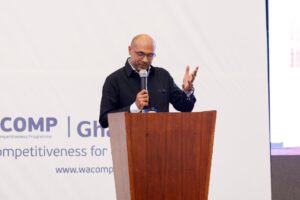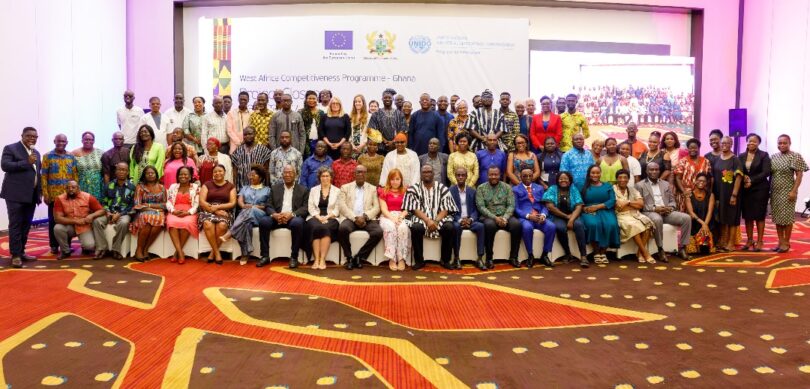Source: Business Desk
ACCRA, 16TH OCTOBER 2024 – The West Africa Competitiveness Programme (WACOMP), spearheaded by the United Nations Industrial Development Organization (UNIDO) and financed by the European Union (EU), successfully concluded in Ghana, marking a transformative journey over more than five years.
The initiative, with a budget of €6,350,000, focused on enhancing the competitiveness of critical value chains such as cassava, mango, pineapple, cosmetics, and personal care products.
Throughout its implementation, the WACOMP project has had a profound impact, supporting 48,849 Small and Medium-sized Enterprises (SMEs), with over 31,000 being women-owned businesses. These SMEs have seen continuous improvements in their ability to compete in both national and international markets.
By leveraging UNIDO’s 5 Cs for competitiveness—coordinate, compete, conform, connect, and credit—WACOMP has elevated production, quality compliance, and market access for SMEs in the targeted sectors. This advancement has led to increased productivity, the creation of sustainable and inclusive jobs, higher income levels for beneficiaries, and the development of a robust Quality Infrastructure System in Ghana.

Mr. Irchad Razaaly, Ambassador of the EU to Ghana
During the closing ceremony, Mr. Irchad Razaaly, Ambassador of the EU to Ghana, remarked, “WACOMP will forever stand as proof that investment in SMEs, agro-business, and private sector development is a win for local entrepreneurs, the government, and the people of Ghana, as well as for our partnership with Ghana.”
Mr. Patrick Yaw Nimo, Chief Director of the Ministry of Trade and Industry (MoTI), emphasized, “Many Ghanaian enterprises previously struggling to be competitive in global markets and lacking the necessary guidance on implementing processes and meeting market standards have now improved their capacities to produce products that align with Good Manufacturing Practices (GMPs) and market requirements.”
As a result of the project, 16 new standards have been established to improve the quality and consumer protection of cosmetics and personal care products, as well as cassava products, both within and beyond Ghana. Furthermore, the Ghana Standards Authority (GSA) Cosmetics Laboratory and Food and Drugs Authority Cosmetics Laboratory have achieved ISO 17025 accreditation, enabling Ghanaian products to meet international certification standards.

Mr. Patrick Yaw Nimo, Chief Director of the Ministry of Trade and Industry
WACOMP has also developed Sector Export Marketing Plans for the three main value chains, collaborating closely with the Ghana Export Promotion Authority to facilitate the international promotion of Ghanaian SMEs. More than 500 market linkages have been created, with Ghanaian SMEs now active in the digital market and engaging in regular exports. Additionally, over 500 SMEs have been connected to financial institutions, allowing them to access affordable credit schemes worth more than four million Ghanaian Cedis.
Mrs. Ebe Muschialli, UNIDO Project Manager, praised the project’s comprehensive and innovative approach, noting, “The impact on Ghanaian SMEs has been tremendous and would not have been possible without the invaluable contributions of all national partners and the vital support of the Ministry of Trade and Industry and the European Union.”
The EU-funded WACOMP is a collaborative effort between the Economic Community of West African States (ECOWAS) and the European Union, contributing to regional economic integration and reinforcing the EU’s commitment to the Economic Partnership Agreement (EPA) with West Africa. In Ghana, the programme was executed by UNIDO in partnership with the Ministry of Trade and Industry (MoTI).
END
About UNIDO: The United Nations Industrial Development Organization (UNIDO) is a specialized agency of the United Nations with a unique mandate to promote, dynamize and accelerate industrial development. UNIDO’s vision is a world without poverty and hunger, where industry drives low-emission economies, improves living standards, and preserves the livable environment for present and future generations, leaving no one behind.
Source: www.thenewindependdentonline.com








